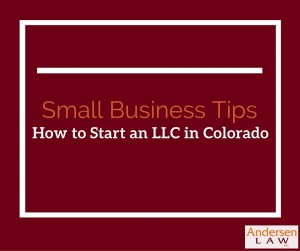
Creating a Limited Liability Company (LLC) is an appealing option when starting a business of any size. True to its namesake, an LLC provides its members limited liability in several areas.
First, an LLC protects its members’ personal assets from being used to satisfy the business’ debts. This makes LLCs an attractive investment option as well, as investors are not personally liable for the business’ debts either. Next, LLC members are typically sheltered from litigation if the business is sued. Further, more tax deductions are available to LLCs than to any other business structure, including deductions for health insurance, pension plans, and travel, automobile, entertainment, and medical expenses. Lastly, in contrast to corporations, an LLC avoids double taxation because an LLC’s income is included in the personal income tax returns of its members (unless an LLC elects to be taxed as a corporation).
Registering an LLC is a relatively simple process. First, you choose a name for your LLC and check the Colorado Secretary of State Business Organizations website to ensure that your desired name has not already been registered. Certain words such as “bank,” “trust,” “insurance,” “surety,” “savings and loan,” “credit union,” “casualty,” and “mutual” may be prohibited or require applicable state agency approval. Further, your LLC name must include the term “Limited Liability Company” or an abbreviation of LLC.
After selecting an available and allowable name for your LLC, you must choose a registered agent. An LLC’s registered agent is its representative who is responsible for annual state filings and sending/receiving documents, including legal service, on the LLC’s behalf. A registered agent can either be an individual (including a member of the LLC) who is a Colorado resident or a business entity that is authorized to transact business in Colorado. If you do not reside in Colorado and are unable to find a Colorado resident/business entity to serve as your LLC’s registered agent, you can employ a registered agent service to act as such for a reasonable fee.

After nominating a registered agent, you file your LLC’s Articles of Organization on the Colorado Secretary of State Business Organizations website. Completing the Articles of Organization requires you to include your LLC’s principal office street/mailing address, your registered agent’s name and street/mailing address, and the name and street/mailing address of the person forming the LLC. You must also specify whether the LLC is managed by members or by managers hired by the LLC, the effective filing date (which can be delayed for up to 90 days), and the name and address of the person causing the document to be delivered for filing. If there is more than one person either forming the LLC or causing the document to be delivered for filing, the additional person(s) name(s) and mailing address(es) must be attached as a separate document. After reviewing the accuracy of this information, you must pay a $50 fee in order to submit the Articles of Organization. Your LLC has now been created, and will be given an identification number.
Although not required by law in Colorado, it is wise to create an operating agreement for your LLC, which outlines the LLC’s formation, operation, and structure. This includes the identification and rights/duties of the LLC’s members, the management capital contributions, the accounting and record keeping, the transfer of interests, and the LLC’s dissolution. It is especially recommended that a single-member LLC create an operating agreement because their limited liability status is more fragile than a multi-member LLC, and an operating agreement helps protect this coveted status. Further, creating an operating agreement helps legitimize your LLC, which boosts investor confidence.
Depending on your LLC’s structure and number of members, the last step in creating your LLC is to obtain an Employer Identification Number (EIN) for federal tax purposes. Colorado does not require LLCs to register for a state taxation number. LLCs may chose how they wish to be taxed because as relatively new, state-created entities, the I.R.S. does not formally recognize them. A multi-party LLC may choose to be taxed either as a corporation or partnership, and needs an EIN for federal tax filings, to hire employees, and to open a bank account. A single-member LLC is considered a disregarded entity that is classified as a sole proprietorship unless it elects to be treated as a corporation. A single-member LLC without employees and with no excise tax liability is not required to obtain an EIN, but will need an EIN to open a bank account.
